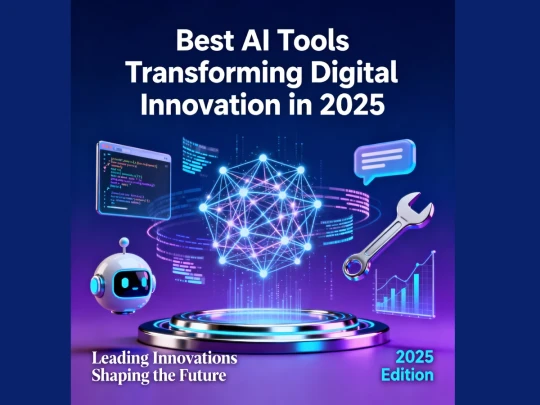AI Tools 2025: The Best Platforms Powering Digital Innovation
Discover the top AI tools for content, automation, coding, and analytics in 2025—boost productivity, scale workflows, and innovate faster with practical, vetted picks.

Artificial intelligence has evolved from a futuristic concept to an everyday business essential. In 2025, AI tools are revolutionizing how we work, create, and innovate across industries. Whether you're a marketer looking to streamline content creation, a developer seeking coding assistance, or a business owner aiming to boost productivity, there's an AI tool designed to meet your needs.
This comprehensive guide explores the most powerful AI tools driving digital transformation and innovation in 2025, helping you stay ahead in an increasingly competitive landscape.
Why AI Tools Matter for Digital Innovation
AI productivity tools combine machine learning, predictive analytics, and automation to handle time-consuming, repetitive tasks that traditionally drain resources. Research shows that early AI adopters are realizing up to 150% productivity gains by automating routine processes while preserving human oversight for strategic decisions. These tools don't just help you move faster—they enable smarter decision-making by transforming complex data into clear, actionable insights.
Top AI Assistant Tools
ChatGPT
OpenAI's GPT-4 remains one of the most powerful generative AI tools available, helping businesses generate human-like content, automate customer interactions, and write complex code. It's particularly valuable for custom software development, UI/UX solutions, and building conversational AI chatbots. Gartner forecasts that by 2025, 75% of enterprise-level conversations will be automated using AI-powered tools like ChatGPT, significantly cutting operational costs while improving efficiency.
Claude
Anthropic's Claude has emerged as a top choice for innovation and R&D professionals, offering sophisticated natural language processing capabilities that excel at complex reasoning tasks.
Google Gemini
Google's AI assistant provides seamless integration with the Google Workspace ecosystem, bringing powerful generative AI features to Gmail, Docs, Sheets, and more. This makes it an ideal choice for businesses already invested in Google's productivity suite.
AI Tools for Content Creation and Marketing
Jasper AI
Jasper specializes in copywriting and marketing content creation, helping teams generate high-quality written content at scale. It's particularly effective for creating blog posts, social media content, and marketing copy that resonates with target audiences.
Surfer SEO
For content optimization, Surfer SEO uses AI to analyze top-ranking pages and provide data-driven recommendations to improve your content's search visibility. This tool is essential for digital marketers focused on organic traffic growth.
Brandwell
Brandwell excels at generating SEO-optimized blog posts, making it a valuable asset for content teams looking to scale their publishing efforts without sacrificing quality.
AdCreative
This AI marketing tool helps businesses create high-converting ad creatives by analyzing performance data and generating optimized designs.=
AI Video and Image Generation Tools
Synthesia
Synthesia leads the video generation space, allowing users to create AI videos with over 240 avatars in 140+ languages. This tool eliminates the need for expensive video production equipment and talent.
Midjourney
For image generation, Midjourney continues to set the standard for creating stunning, high-quality visuals from text prompts. It's particularly popular among designers, marketers, and content creators.
Canva Magic Studio
Canva's AI-powered design suite democratizes graphic design, enabling anyone to create professional-looking visuals, presentations, and marketing materials.
Adobe Firefly
Adobe's AI image generation tool integrates seamlessly with Creative Cloud applications, offering powerful image creation and editing capabilities for professional designers.
AI Automation and Workflow Tools
Gumloop
Gumloop is revolutionizing AI automation by combining the workflow capabilities of tools like Zapier with advanced LLM integration. It connects AI models like GPT-5, Claude, and Grok to your internal tools without requiring coding knowledge, making it accessible to non-technical users.
Zapier
Zapier remains essential for automating repetitive tasks across thousands of apps, helping businesses create efficient workflows that save hours of manual work.
n8n
This open-source automation tool offers powerful workflow automation capabilities with extensive integration options, particularly valuable for technical teams.
AI Tools for Research and Knowledge Management
Perplexity
Perplexity has become a go-to search and research tool for innovation professionals, offering AI-powered search capabilities that provide comprehensive, cited answers.
NotebookLM
Google's NotebookLM excels at querying documents and even creating podcast-style summaries of complex information, making it invaluable for research-intensive work.
Notion Q&A
Notion's AI-powered Q&A feature helps teams quickly find information stored in their knowledge bases, improving collaboration and reducing time spent searching for documents.
AI Coding and Development Tools
GitHub Copilot
GitHub Copilot assists developers by suggesting code completions, generating functions, and helping debug issues, significantly accelerating the development process.
Cursor
Cursor is an AI-powered code editor that helps developers write, edit, and understand code more efficiently.
TensorFlow
Google's open-source machine learning framework remains the developers' favorite choice for designing and training machine learning models for applications ranging from predictive analytics to natural language processing.
AI Writing and Editing Tools
Grammarly
Grammarly's AI-powered writing assistant helps refine your writing by checking grammar, suggesting improvements, and ensuring clarity and tone consistency.
Rytr
Rytr offers AI-powered content writing capabilities for various formats, from blog posts to social media content, making it a versatile tool for content creators.
Hemingway App
This AI editing tool focuses on improving readability by highlighting complex sentences, passive voice, and suggesting simpler alternatives.
Specialized AI Business Tools
Salesforce Einstein
Salesforce's AI platform integrates with CRM systems to provide predictive analytics, automated insights, and intelligent recommendations for sales and marketing teams.
IBM Watson
IBM Watson continues to drive innovation in healthcare and business applications with its powerful AI capabilities for data analysis, natural language processing, and decision support.
UiPath
UiPath specializes in robotic process automation (RPA), helping businesses automate repetitive tasks and streamline operations through AI-powered workflows.
How to Choose the Right AI Tools
When selecting AI tools for your business, consider these factors:
Integration capabilities: Ensure the tool connects with your existing software ecosystem to create seamless workflows.
Cost and scalability: Evaluate pricing models and whether the tool can grow with your business needs.
Ease of use: Look for tools with intuitive interfaces that don't require extensive technical expertise.
Specific use cases: Match tools to your actual needs rather than adopting technology for its own sake.
Ethical considerations: Consider data privacy, security, and responsible AI practices when evaluating tools.
The Future of AI Tools
The AI landscape continues to evolve rapidly, with innovation professionals reporting that 47% find AI tools' impact "very positive" and 46% "somewhat positive". As AI technology advances, we're seeing trends toward more specialized tools, better integration capabilities, and increased accessibility for non-technical users.
The key to success isn't adopting every new AI tool that emerges, but strategically selecting tools that address your specific challenges and integrate smoothly into your workflows. By automating routine tasks and leveraging AI insights, businesses can focus on strategic work that drives real innovation and competitive advantage.
AI tools are no longer optional for businesses seeking to remain competitive—they're essential infrastructure for digital innovation in 2025 and beyond


